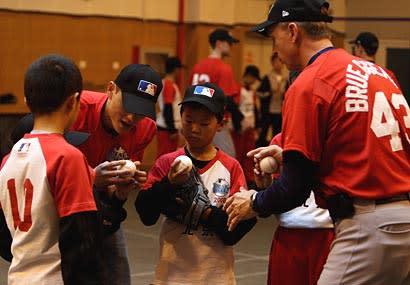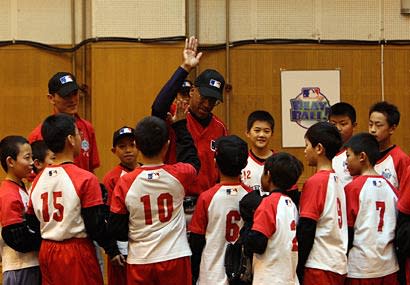Baseball's missionaries
BEIJING – If baseball ever really takes hold in China, if the diamond equivalent of Yao Ming surfaces, if tickets, caps and jerseys are sold by the multi-million, Jeff Brueggemann will have had more to do with it than Joe Torre. And Andre Rabouin will be more responsible than Trevor Hoffman, Matt Kemp or any of the other Major Leaguers here to play exhibition games Saturday and Sunday.
Never heard of them? You aren't alone. Brueggemann and Rabouin are as anonymous in the U.S. as their names are difficult to pronounce. They are lifelong coaches at a variety of levels, none above the low minors. They know and love the game, and for the longest time the game didn't give back the way it does for 99 percent of those fortunate enough to be cogs in the $6-billion-a-year MLB machine.

Jeff Brueggemann, one of baseball’s key ambassadors to China, teaches players at Fengtai Elementary School in Beijing.
(Gu Zhi Chao / Yahoo! China)
That well could change. At the very least, they will take personal satisfaction in any progress made in spreading the gospel of the almighty diamond throughout the largest country in the world.
On Friday morning they were at it again, wearing cheery colorful uniforms with "MLB Play Ball" logos, working with hand-picked 10-12 year-olds in the basement gymnasium of a public school in South Beijing. They travel from city to city in China, holding clinics for players and for coaches, teaching the rules of the game to university students and proper arm action to grade-school kids.
Brueggemann and Rabouin are Johnny Appleseeds, carrying out MLB's evangelical plan of turning more than a billion people into baseball fans, players and – most of all – consumers with missionary zeal.
The familiar faces of Torre, Bud Black and Dave Winfield were among those toasted at the MLB reception party at the Grand Hyatt the evening before the first of two historic exhibition games between the Los Angeles Dodgers and San Diego Padres, but Brueggemann and Rabouin certainly deserved a bow.
"It's fellows like that who are laying the groundwork for any accomplishments we make in getting people here to appreciate this game," Torre said.
The clinic at the public school was billed by MLB as being conducted by Padres players. But the van carrying Adrian Gonzalez, Heath Bell and Justin Germano was late because of heavy traffic, which just gave Brueggemann and Rabouin more time to do their thing, breaking the players into small groups for sharply organized drills. Several fledgling Chinese coaches stood by, soaking in every word.
"The most fun is working with kids, you see the joy of the game in them and watch them improve," Rabouin said, "but our biggest impact is teaching the teachers."
Rabouin, 57, will return to the U.S. in a few weeks to serve as pitching coach for the Southern Maryland Blue Crabs in the independent Atlantic League. Brueggemann is a portfolio manager who played for six years in the Minnesota Twins organization. He has spent 11 years in China and has become perhaps the leading expert on baseball in the country.
"The idea is to create a large pool of kids playing the game," Brueggemann said, "and the cream will rise to the top."
The two coaches helped run a landmark academy last year for 86 Chinese teenagers chosen by physical education teachers throughout the country for their perceived baseball skills. Brueggemann doesn't like the process, which he believes excludes players whose love of the game might be greater than their natural athletic prowess.

Andre Rabouin shares his coaching knowledge at Beijing's Fengtai Elementary School.
(Gu Zhi Chao / Yahoo! China)
"The way they choose who gets to play is not efficient," Brueggemann said. "People of all body types play this game well. If players were chosen this way in the U.S., Prince Fielder and David Eckstein would have never had a chance. Randy Johnson would have been told to play basketball."
Still, the academy produced results. The best player, in the opinion of both U.S. coaches, was a 12-year-old infielder named Han Jicheng.
"He has a chance to be a superstar," Rabouin said. "We called him Ichiro because of his batting style."
Three other players from the academy were added to the junior national team, coached by Brueggemann. Many of the best young players are fast, and they have excellent eye-hand coordination, the coaches said.
"The biggest thing they lack is upper-body strength," Brueggemann said. "We've seen a handful of players with 'B' tools, not 'A' tools, but kids we can project out as draftable."
Getting parents to buy into baseball is difficult. An entire generation of Chinese had zero exposure to the game because it was banned by Chairman Mao Zedong from 1966 until about 1976.
"Some of the parents seem like they don't care," Brueggemann said. "Others, though, are extremely proud that their sons are involved in something new and exciting."
So far, MLB's baseball awareness program has been restricted to major cities. A game that enjoys a rich tradition of producing talent in every farm town in America and in the remotest of outposts in countries such as the Dominican Republic has had no rural penetration in China.
Maybe the next step in MLB's quest to find the baseball equivalent of Yao Ming would be to seek out more Brueggemanns and Rabouins.
"To canvas this country the way MLB envisions and the way it has to happen to get maximum results, we need more coaches spreading the word," Brueggemann said. "It's rewarding work, I can tell you that much."

